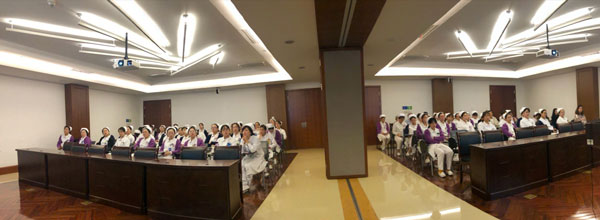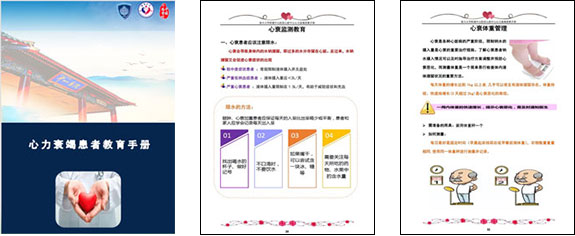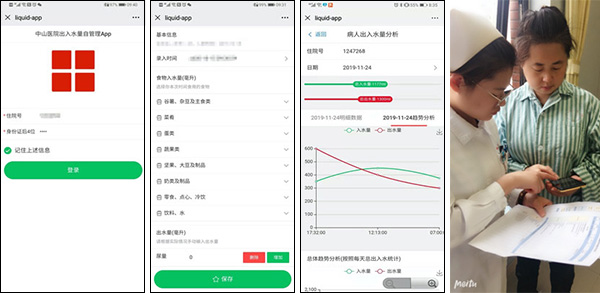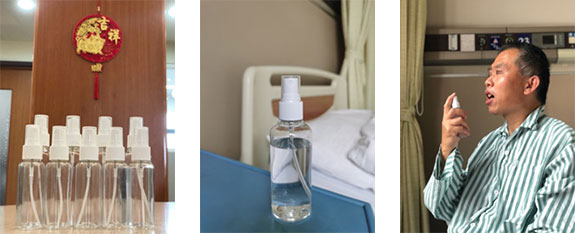Better fluid management for better health outcomes

Heart failure is the final stage of various cardiac diseases. It is a highly symptomatic and disabling condition, and given there are more than 10 million heart failure patients in China, the social and economic burden of heart failure is significant.
One of the primary aims of healthcare for this cohort of patients is to slow the disease progression and avoid readmissions. Fluid management is central to the effective treatment of heart failure, typically requiring multi-pronged strategies that include fluid and sodium restriction, use of diuretics, and daily weight monitoring. Poor fluid management is often associated with worse outcomes, such as readmission, low quality of life and even death. However, the majority of patients with heart failure and clinical staff have limited knowledge about effective implementation of fluid management.
Zhiyun Shen is a cardiac nurse in the Department of Cardiology at Zhongshan Hospital, Fudan University in Shanghai, PR China. The Department of Cardiology in Zhongshan Hospital has seven wards and one intensive care unit with 233 nurses and 142 physicians. There are 44 beds, and approximately 30 patients with heart failure are admitted to each ward every month.
Zhiyun is dedicated to ensuring patients and their families are well looked after. This passion for cardiac patient care led her to undertake the Evidence Implementation Training Program (formerly the Evidence-based Clinical Fellowship Program), which equips clinicians with the skills and knowledge to implement evidence into practice in order to improve patient health outcomes. As part of the program, Zhiyun conducted an evidence implementation project on heart failure patient management. Zhiyun says:
Substantial evidence indicates that patients with heart failure need fluid management, so we needed to change how we managed our care of patients with heart failure. The aim of my evidence implementation project was to promote evidence-based practice by nurses, thereby improving fluid management for patients with heart failure.
Using JBI PACES software and following the JBI evidence implementation approach, Zhiyun conducted a baseline audit. The results revealed that the majority of nurses at the hospital had limited knowledge about fluid management for heart failure patients and that most patients with heart failure were unaware of how to manage their condition. ‘Nursing staff were uncertain about which patients should be on restricted fluid intake, for example, acute heart failure or chronic heart failure, and the adequate amount of fluid that can be consumed by a patient in a day’, Zhiyun explains.
Using the Getting Research into Practice (GRiP) approach, Zhiyun and her project team identified barriers to achieving compliance with best practice recommendations for heart failure management and subsequently implemented a number of targeted strategies to overcome the identified barriers. One of these strategies was an education session for nurses, which was held to engage them with the project and increase their knowledge of fluid management for heart failure patients.

Nurses were asked to conduct face-to-face education/information sessions for each patient to improve patients’ and their families’ awareness of heart failure management. Supplementary resources were developed for nurses to disseminate to patients and their families, such as brochures on disease progression and fluid management for heart failure patients.

A fluid volume assessment form was also developed to ensure volume assessment is performed accurately in patients with heart failure. The tool measures whether or not patients are fluid overloaded, which would then indicate the need to restrict fluid intake.
In addition, an app was developed to allow convenient and accurate recording of the patient’s volume of fluid intake and output. Patients scan their QR code and input their food and drink consumption and the amount of output (urine, vomitus). Attending nurses also used the app to monitor the total amount of intake and output for each patient. Once a patient has consumed 1 litre of fluid, the app sends a notice to patients and nurses. Compared with the traditional method of collecting self-reported data from patients, the app is more efficient and prevents data loss.

The team also found a simple solution to help patients cope with thirst. Patients with heart failure who are on fluid restrictions experience thirst, which can be distressing and accounted for poor compliance with limiting fluid intake as part of their management. With input from colleagues in Zhongshan Hospital, Zhiyun found that a spray bottle filled with water could relieve patients’ thirst. As a result, patients were asked to buy a spray bottle and told that they can add peppermint or lemon to the water according to their personal preferences. When patients felt thirsty, they sprayed the water into their mouth, which only required a minimal amount of water to make them feel more comfortable.

Using relatively simple and practical strategies, Zhiyun’s evidence implementation project resulted in a significant increase in nurses’ and patients’ compliance with best practice for fluid management in heart failure. ‘After knowing the benefits of applying evidence-informed recommendations into clinical practice, all of the staff were willing to participate, and expressed their wish to undertake relevant work. Patients also cooperated well and recognised the benefits of self-management’, Zhiyun reports.
A follow-up audit confirmed that volume assessment in patients with heart failure was routinely being conducted by nurses, from 0% at baseline to 100% following the implementation of education sessions and supplementary resources. More importantly, patients with chronic heart failure who demonstrated signs and symptoms of congestion were able to restrict their fluid intake to 1.5 litres a day and, conversely, those patients who did not require fluid restriction maintained adequate fluid intake after being informed about the risks associated with excess fluid loss.
Overall, this implementation project achieved significant improvements in compliance with best practice for fluid management in heart failure patients. Nurses’, patients’ and their families’ awareness of and knowledge about fluid management were significantly improved. The development of an app for monitoring the amount of intake and output highlights Zhiyun and her team’s ingenuity and resourcefulness for improving patient experience. Although the app has been valuable, it has limited capacity for determining water content for different foods and, therefore, plans to improve the functionality of the app are currently being explored. Zhiyun and her team are also planning to undertake future research to identify the impact of fluid management on long-term prognosis and quality of life for their patients with heart failure.
Authors
Yuxia Zhang,1,2 Yan Hu,3,4 Yu Chen,3,4 Zhiyun Shen,1,2 Ying Lin,1,2 Yingfeng Zhou,3,4 Zheng Zhu,3,4 Weijie Xing3,4 Qi Zhang,1,2 Xian Zhang1,2
1 ZhongShan Hospital, Fudan University
2 Zhongshan Hospital Centre of Critical Care: a JBI Centre of Excellence
3 Fudan University EBN Centre: a JBI Centre of Excellence
4 Fudan University, School of Nursing

